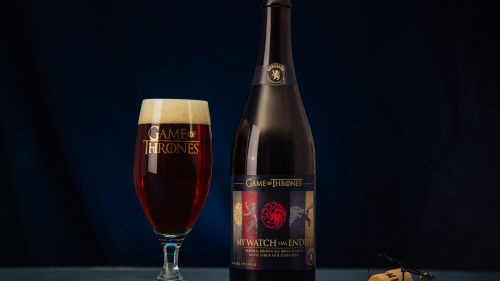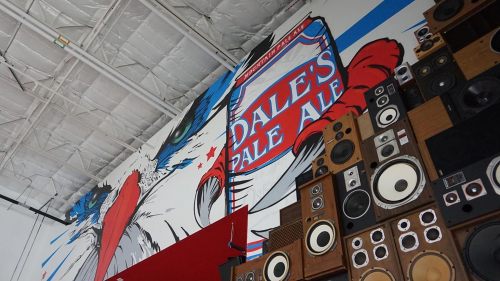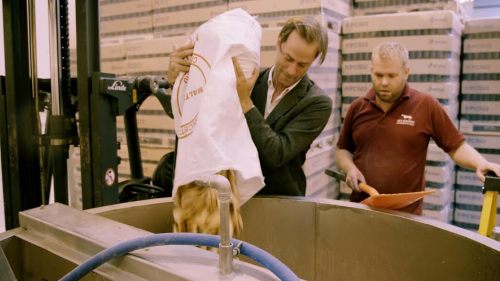The Badass Hall of Fame: Ninkasi
Borne of the flowing water,
Tenderly cared for by the Ninhursag,
Borne of the flowing water,
Tenderly cared for by the Ninhursag,Having founded your town by the sacred lake,
She finished its great walls for you,
Ninkasi, having founded your town by the sacred lake,
She finished it’s walls for you,Your father is Enki, Lord Nidimmud,
Your mother is Ninti, the queen of the sacred lake.
Ninkasi, your father is Enki, Lord Nidimmud,
Your mother is Ninti, the queen of the sacred lake.You are the one who handles the dough [and] with a big shovel,
Mixing in a pit, the bappir with sweet aromatics,
Ninkasi, you are the one who handles the dough [and] with a big shovel,
Mixing in a pit, the bappir with [date] - honey,You are the one who bakes the bappir in the big oven,
Puts in order the piles of hulled grains,
Ninkasi, you are the one who bakes the bappir in the big oven,
Puts in order the piles of hulled grains,You are the one who waters the malt set on the ground,
The noble dogs keep away even the potentates,
Ninkasi, you are the one who waters the malt set on the ground,
The noble dogs keep away even the potentates,You are the one who soaks the malt in a jar,
The waves rise, the waves fall.
Ninkasi, you are the one who soaks the malt in a jar,
The waves rise, the waves fall.You are the one who spreads the cooked mash on large reed mats,
Coolness overcomes,
Ninkasi, you are the one who spreads the cooked mash on large reed mats,
Coolness overcomes,You are the one who holds with both hands the great sweet wort,
Brewing [it] with honey [and] wine
(You the sweet wort to the vessel)
Ninkasi, (...)(You the sweet wort to the vessel)The filtering vat, which makes a pleasant sound,
You place appropriately on a large collector vat.
Ninkasi, the filtering vat, which makes a pleasant sound,
You place appropriately on a large collector vat.When you pour out the filtered beer of the collector vat,
It is [like] the onrush of Tigris and Euphrates.
Ninkasi, you are the one who pours out the filtered beer of the collector vat,
It is [like] the onrush of Tigris and Euphrates.
Now you’re saying ‘Okay, it’s cool that there was an ancient Sumerian goddess of beer, but big deal. There was a god of wine in Rome, and probably plenty of other gods dedicated to getting fucked up in pantheons across the globe.’ You’d be right, but there is one other thing that makes Ninkasi so badass: she helped create civilization.
Not her directly. I don’t think I believe that she ever actually existed. But the discovery and first fermentation of beer is one of the events that led to the creation of civilization as we know it today. The Sumerians were the first people to drink beer, back in 4000 BC or so (or at the very beginning of the world, if you’re into Creationism), and it transformed their society for the better. They had already begun settling down, and the Stone Age farmers were creating small societies. But those societies would need to get bigger to become the civilization we know today, and beer was the lubricant.
Archeologist Brian Hayden of Simon Fraser University believes that beer is what led early man to cultivate cereals, which take a ton of work to make edible. He believes the reason that the farmers bothered going through the lengthy, strenuous process of gathering, husking, winnowing and grinding the cereal was because they wanted to make beer from it. These early men had probably already discovered wild cereal fermentation and understood that you could get drunk off the stuff, and so they set out to replicate that process.
“It’s not that drinking and brewing by itself helped start cultivation, it’s this context of feasts that links beer and the emergence of complex societies,” Hayden has said. “Feasts are essential in traditional societies for creating debts, for creating factions, for creating bonds between people, for creating political power, for creating support networks, and all of this is essential for developing more complex kinds of societies. Feasts are reciprocal — if I invite you to my feast, you have the obligation to invite me to yours. If I give you something like a pig or a pot of beer, you’re obligated to do the same for me or even more.”
Just as it is today at your favorite bar, beer was the social glue that brought these isolated farmers together in a bigger way in Mesopotamia, considered the cradle of civilization. Beer was a not just a feast item but a major deal to the people at the time. In fact the Gilgamesh Epic, the earliest work of literature known to us, talks about beer:
“Enkidu, a shaggy, unkempt, almost bestial primitive man, who ate grass and could milk wild animals, wanted to test his strength against Gilgamesh, the demigod-like sovereign. Taking no chances, Gilgamesh sent a (prostitute) to Enkidu to learn of his strengths and weaknesses. Enkidu enjoyed a week with her, during which she taught him of civilization. Enkidu knew not what bread was nor how one ate it. He had also not learned to drink beer. The (prostitute) opened her mouth and spoke to Enkidu: ‘Eat the bread now, O Enkidu, as it belongs to life. Drink also beer, as it is the custom of the land.’ Enkidu drank seven cups of beer and his heart soared. In this condition he washed himself and became a human being. “
That seems to me to be a metaphor for how beer (and pussy, to be frank) tamed the wild savage nomads.
As for Ninkasi’s hymn - in 1989 Anchor Steam Beer, working with Professor Solomon Katz (who believes that the cultivation of crops started specifically so that people could make beer), recreated the recipe in the hymn. The recipe in the hymn is unusual by modern standards because it contains no hops - the ingredient would have been unknown to the Sumerians - and is a bread-based brew. That meant the brewers had to figure out to recreate Sumerian bappir bread; they also had to figure out how to sweeten the beer without hops. Sweetening is mentioned in the hymn, so they went with honey and dates*. In the end they created a beer they quite liked, although they said they would have added more bread for flavoring if they did it again. The beer was drunk in the traditional way - out of large pots using long straws, which helped keep bitter unfiltered residue out of the mouth.
And so we induct Ninkasi, whose hymn was a way of helping pre-literate men remember the way to make their most special drink. Thanks, Ninkasi, for being there to help usher us into the age of civilization.
Sources:



